|
U.S. Grant visits the Mount
Pulaski Courthouse in honor of Lincoln’s birthday
 Send a link to a friend
Send a link to a friend
 [February 11, 2019] [February 11, 2019]
On Saturday, the Mount Pulaski Courthouse celebrated Abraham
Lincoln’s Birthday with a special open house in the afternoon.
Upstairs in the historic courtroom, it was standing room only as
guest speaker Larry Werline in the persona of General Ulysses S.
Grant spoke to the group about his life and the role he played in
the many terrible battles of the Civil War.
Werline hails from the Chatham area and is now retired after working
many years for Oracle Corporation. For the last 20 years he has been
studying and portraying General Grant. He has done portrayals at the
Old State Capital in Springfield as well as the Abraham Lincoln
Presidential Library and Museum.

Werline delivered a captivating program that was thoroughly enjoyed
by all the guests. After he was finished he was asked to “come out
of character” for a personal question about his history background.
Was he a historian? Werline said he was not an educated historian
and he felt that was to his favor. He explained that in history
there are a number of accounts written by expert historians that
sometimes contradict one another. A real historian will give a
presentation that represents multiple accounts, and sometimes leaves
people wondering what is the correct version. Werline said that he
has studied many accounts of Grant, and from those he has selected
the portions he chooses to believe and has incorporated them into
his presentation.
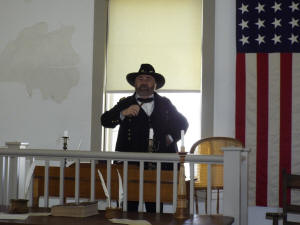
Werline began his presentation with comparisons of himself to
Abraham Lincoln in their youth. Both had tender loving mothers, and
fathers who were harsh. Both were raised on hard work and Grant
recalled many of the events of his own youth working in his father’s
business – a tannery in Galena.
Grant explained that becoming a part of the Union Army was
unintentional on his part. He had shared with his father as a
youngster that when he grew up, there was no way that he would work
in the family business. He wanted no part of the tannery. His father
in turn then insisted that Grant would attend college and have
another career.
Grant’s best friend was a year older than Grant and was admitted
into West Point under the recommendation of the local state
representative. His tuition as a recommended student/future soldier
was free. However, the friend got booted out at West Point. When
Grant’s father heard of this, he used his own influence with the
representative to get Grant accepted into the college.
At first Grant refused to go swearing he had no intention of
becoming a soldier for the sake of an education. However, his father
used his special kind of influence to convince Grant that he should
attend West Point.
Grant had been born Hiram Ulysses Grant. It was at West Point that
he became Ulysses S. Grant. There was a mix up when his name was
submitted by the state representative and he was recorded at the
school as Ulysses Simon (his mother’s maiden name) Grant. Grant said
he was not bothered by the change because at West Point every cadet
was given a nickname. He said that with his birth name initials
being H.U.G. he was very much dreading the name he might be given.
However, when his name was recorded as Ulysses S. Grant, that made
the nickname prospects more tolerable.

It was his good friend William Tecumseh Sherman who actually gave
him the nickname of “Uncle Sam” Grant. Another name considered at
West Point was “United States” Grant. Later in life, during the
civil war journalists would coin him as “Unconditional Surrender”
Grant.
Grant told many stories as he walked through the history of the
civil war and the role he played. Of those some that stood out
included his interactions with President Lincoln.
One story in particular Grant prefaced by talking about the former
Confederate slaves who joined the Union Army. As the south began to
falter, many of the slaves were freed when territories were
surrendered over to the north. Many of those slaves then joined the
Union Army to help fight for the freedom of their fellow slaves and
the eradication of slavery all together.
Grant said that many were skeptical of allowing the former slaves to
join the army. It was said that the slaves were lazy and ornery and
would not do anything without a slave master forcing them. Grant
said nothing could have been further from the truth. He said that
180,000 men were trained and ready for battle, and another 20,000
served as support for the army, working to assure the troops
received supplies as needed.
Grant said that to have those men come from the Confederate side to
the Union side, in many ways became a turning point for the north.
He explained those men while not fighting for the Confederates had
been engaged in manufacturing and delivery of supplies and offering
other support service to the Confederates. When they gained their
freedom they left the south greatly at a disadvantage and gave the
north much needed manpower. He explained that it was a double hit
against the south.
Moving on, Grant explained that at a point in time when he and his
wife were stationed in the deep south, his wife suggested that Grant
invite the President to come for a visit and to see the war in
action. The President agreed and came for what was scheduled as a
two-day visit. He ended up staying along with wife Mary, for two
full weeks.

At a point in time during that visit, Grant ordered that there be a
soldier review for the President. He chose the company that would be
reviewed and that company prepared for the presidential inspection.
He said for the review, the soldiers were to be clean, have clean
uniforms, cleaned rifles and would polish their brass buttons and
shoes. On the day the president was to inspect the troops a battle
ensued with the south and the company in review was involved. No
longer being clean and healthy it was not a good company to review.
Someone suggested that one of the black companies that had not been
involved in that battle should be reviewed instead. Grant said while
they were not inspection ready they were in better shape than the
other troop, so it was decided that the President would meet this
troop of freed slaves.
Grant said at the time of inspection the soldiers lined up and stood
at attention awaiting the arrival of the President. But, when they
saw him coming from off in a distance, they began to shout and cheer
and applaud, something that was not acceptable during a review.
However, the men were so overwhelmed that no one could call them
back to attention.
Grant said as Lincoln rode up to the troop, the soldiers called out
to him, thanked him, and reached out to touch him. Lincoln spoke to
each one, touching their hands as he passed by. Grant said it was a
very moving moment, as the black soldiers showed their affection for
the man who had signed the Emancipation Proclamation and set the
wheels in motion for their freedom.
There were many other stories told including how ships were wrapped
in bales of cotton so as to float down the river past Vicksburg
without being shot down. The cotton bales, confiscated from the
south, were tied to the ships to provide a buffer that would prevent
cannon balls from sinking the ships. The idea worked and with the
soldiers on the ship floating past the Confederate fort, the north
was able to attack from behind and win Vicksburg.
During the war, there were those in the north who greatly disliked
Grant, and those who held him in high regard. Those who disliked him
in Washington, on numerous occasions begged the President to fire
Grant, but that never happened. However, after one
particularly bloody battle, when the president was urged to fire the
General, he did de-mote him. Of course, Grant would later earn his
rank back and go on to become only the second Three-star General
(Washington was the first) in history at that time.
[to top of second column] |
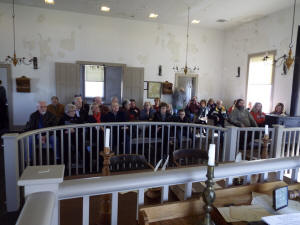

In respect to those who held him in high regard. Grant told another
story. He said that in the north there were many who knew him, but
had never seen him. Often times, journalists would use pictures of
other generals and put Grants name in the caption. To that end, one
such picture showed a general holding a cigar and pointing outward
as though giving the command to “Charge.” Grant said after that
picture was published, grateful northerners began sending him boxes
of cigars, lots of boxes of cigars. So, originally being a “pipe
man” who could not afford the expensive cigars, he switched his
habit.
Ironically, it was that habit that eventually took his life. Grant
often times chewed on the cigars rather than smoking him, and when
he died he had throat cancer.
Grant also spoke about the death of the President. He felt compelled
to recount that he and his wife were invited to the theater with the
Lincoln’s on the night the President was killed. He said the
Presidents body guards were neglectful, leaving their President
unprotected. Grant said that the men who traveled with him would
never have been so negligent, and he himself would never have been
so relaxed as to not know what was going on. He felt that had he
gone to the theater that night with his President the assassination
would have been a failed attempt.
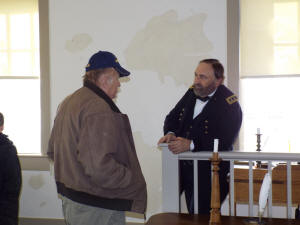
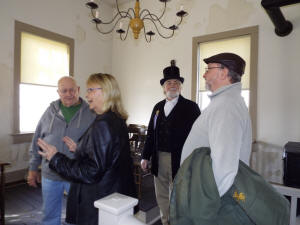
When Grant’s presentation was completed, the floor was opened to
questions from the audience. Grant fielded several questions then,
and also stayed in the upstairs courtroom for quite some time
afterward to speak to guests who wanted to talk one-on-one.

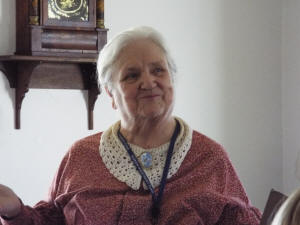
The site director at the Mount Pulaski Courthouse Barbara Stroud-Borth
had welcomed all guests at the beginning of the program. During that
time she noted that with such a large crowd on hand it would be
difficult to give appropriate tours of the building. She encouraged
all guests to come back sometime on a regular day when courthouse
volunteers could give them an adequate tour of the building.
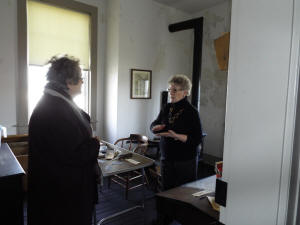
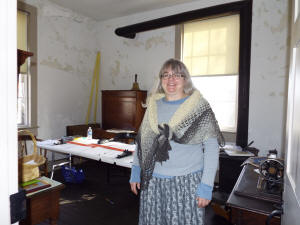
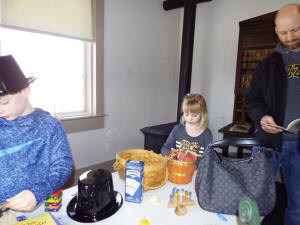
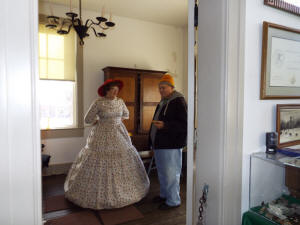
The downstairs area of the courthouse offered fun and games for
children and sweet treats for everyone including cookies, apple pie
with rum sauce, coffee and punch.

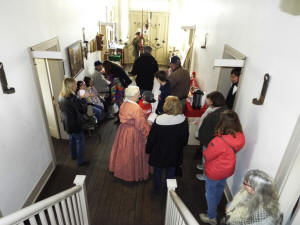
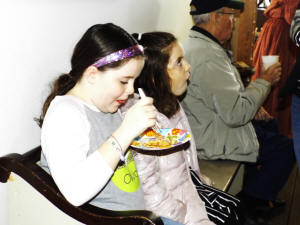
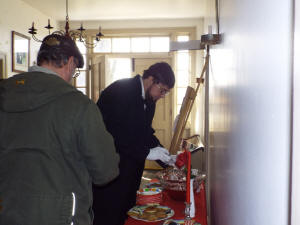
Stroud-Borth said she was very excited for the turnout on Saturday.
There were children on hand, but she said she would love to see more
children become engaged with the courthouse and the activities and
crafts provided. Those crafts and activities were focused around
things that would have been common place in the 1860’s such as quill
pens, telegraphs, and simple games children played.
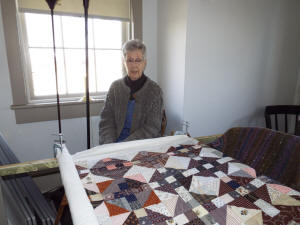
Upstairs, in addition to the Grant presentation Alexis Asher was set
up in one of the small rooms with a quilting frame and quilt. She
offered demonstrations of quilting and talked about the task that
was often performed in the 1800’s. The quilts were made into warm
blankets that were used in the home.
The Saturday event at the Mount Pulaski Courthouse was very nice,
and well worth attending. Many enjoyed cookies decorated in
patriotic and Abraham Lincoln themes. A nice cup of hot coffee or a
fresh glass of punch was enjoyed by many before heading back outside
into the chill of the day.
[Nila Smith]
 |